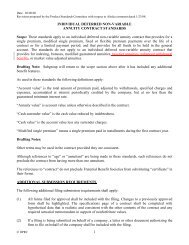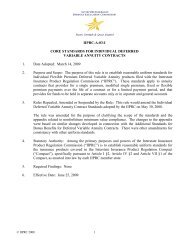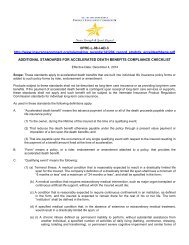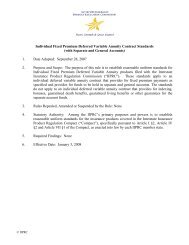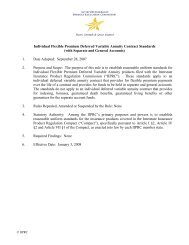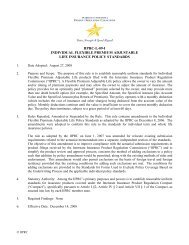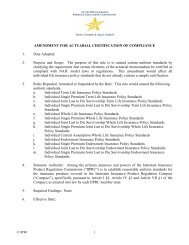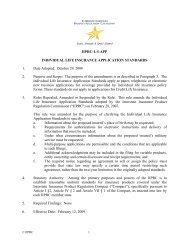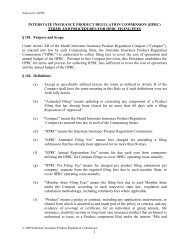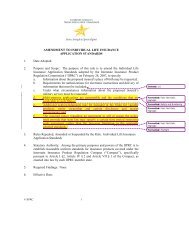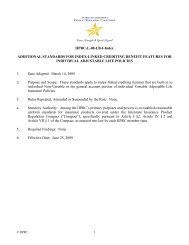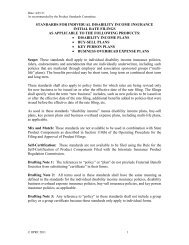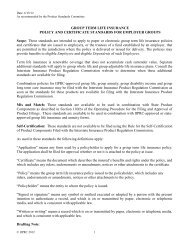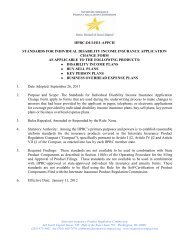core standards for individual long term care insurance policies
core standards for individual long term care insurance policies
core standards for individual long term care insurance policies
Create successful ePaper yourself
Turn your PDF publications into a flip-book with our unique Google optimized e-Paper software.
Date: 7/13/10<br />
Under review by the Product Standards Committee<br />
Higlighted changes are those added since the 7/6 draft.<br />
F. BENEFIT TRIGGERS<br />
(1) The policy shall condition the payment of benefits on a de<strong>term</strong>ination of the insured’s ability to per<strong>for</strong>m<br />
activities of daily living and on cognitive impairment. Eligibility <strong>for</strong> the payment of benefits shall not be<br />
more restrictive than requiring either a deficiency in the ability to per<strong>for</strong>m not more than three of the<br />
activities of daily living or the presence of cognitive impairment.<br />
(2) Activities of daily living shall include at least all of the following as defined in the policy:<br />
(a)<br />
(b)<br />
(c)<br />
(d)<br />
(e)<br />
(f)<br />
Bathing;<br />
Continence;<br />
Dressing;<br />
Eating;<br />
Toileting; and<br />
Transferring.<br />
(3) Companies may use activities of daily living in addition to those contained in Item (2) to trigger covered<br />
benefits as <strong>long</strong> as they are defined in the policy.<br />
(4) Companies may use additional provisions <strong>for</strong> the de<strong>term</strong>ination of when benefits are payable under a<br />
policy; however, the provisions shall not restrict, and are not in lieu of, the requirements of Items (1) and<br />
(2) above.<br />
(5) For purposes of this Item (F), the de<strong>term</strong>ination of a deficiency shall not be more restrictive than:<br />
(a)<br />
(b)<br />
Requiring the hands-on assistance of another person to per<strong>for</strong>m the prescribed activities of daily<br />
living; or<br />
If the deficiency is due to the presence of a cognitive impairment, supervision or verbal cueing by<br />
another person is needed in order to protect the insured or others.<br />
(6) Assessments of activities of daily living and cognitive impairment shall be per<strong>for</strong>med by licensed or<br />
certified professionals, such as physicians, nurses or social workers.<br />
(7) Notwithstanding Item (1) above, <strong>policies</strong> that are intended to be tax-qualified <strong>policies</strong> shall comply with<br />
§ 3G of these <strong>standards</strong>.<br />
G. ADDITIONAL BENEFIT TRIGGERS FOR TAX-QUALIFIED LONG-TERM CARE INSURANCE<br />
POLICIES<br />
(1) A tax-qualified policy shall state that the policy shall provide benefits only <strong>for</strong> qualified <strong>long</strong>-<strong>term</strong> <strong>care</strong><br />
services received by a chronically ill <strong>individual</strong> provided pursuant to a plan of <strong>care</strong> prescribed by a licensed<br />
health <strong>care</strong> practitioner.<br />
Drafting Note: The federal tax requirements <strong>for</strong> the <strong>term</strong> “qualified <strong>long</strong>-<strong>term</strong> <strong>care</strong> services” has been added to<br />
assist states in regulating qualified <strong>long</strong>-<strong>term</strong> <strong>care</strong> <strong>insurance</strong> <strong>policies</strong>, which are defined in § 7702B(b) of the Internal<br />
Revenue Code of 1986, as amended. The Internal Revenue Code of 1986 is subject to amendment by Congress and<br />
to interpretation by the Treasury Department, the Internal Revenue Service and the courts.<br />
(2) A tax-qualified <strong>long</strong>-<strong>term</strong> <strong>care</strong> <strong>insurance</strong> policy shall state that the payment of benefits is conditioned on a<br />
de<strong>term</strong>ination of the insured’s inability to per<strong>for</strong>m activities of daily living <strong>for</strong> an expected period of at<br />
least ninety (90) days due to a loss of functional capacity or to severe cognitive impairment.<br />
© IIPRC 2010 9



